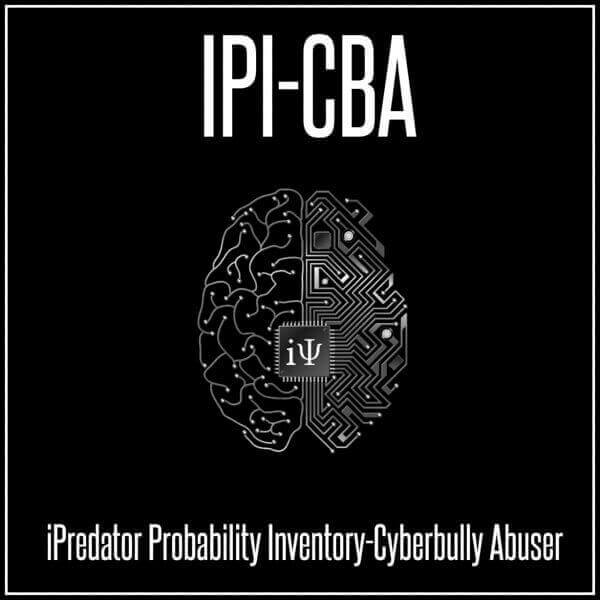iPredator Probability Inventory – Cyberbully Abuser
[IPI-CBA]
The iPredator Probability Inventory-Cyberbully Abuser [IPI-CBA] is an internet safety tool and cyber-attack risk assessment authored by Michael Nuccitelli, Psy.D., a New York State licensed psychologist, forensic psychology consultant and iPredator Inc. founder. The iPredator Probability Inventory-Cyberbully Abuser [IPI-CBA] assesses a child’s online risk activities, cyber-attack vulnerabilities and internet safety prowess. Designed to be multi-functional, the IPI-CBA is a structured inventory for diagnostics, education, investigation and data collection. The IPI-CBA can also be used for compiling evidentiary information for law enforcement, Internet Service Providers, school officials and the legal system if the child is suspected of being a cyberbully.
Developed by Dr. Nuccitelli, the IPI-CBA helps parents, educators and pediatric professionals investigate a child’s probability of engaging in harmful online activity towards a targeted child. The cyberbully is a child who engages teasing, taunting and disparagement of a target child using the internet and Information and Communications Technology (ICT.) As America is starting to address this growing societal epidemic, few parents, primary caregivers and educators take into consideration, it is another child who is the assailant.
The IPI-CBA is a 110-question diagnostic and education tool designed to examine a child’s risk of being a cyberbully or cyberbully bystander. To view a sample of the items that are used in internet safety tools, feel free to visit iPredator Inc.’s cyber risk list web page or clicking on this link: Cyber Risk List.

iPredator Probability Inventory – Cyberbully Abuser
Description
iPredator Probability Inventory-Cyberbully Abuser [IPI-CBA]: The iPredator Probability Inventory-Cyberbully Abuser is a 110-question diagnostic, education, assessment and data collection tool designed to investigate a child or adolescent’s online probability and potential to intimidate, humiliate and taunt other children engaging in online harassment and cyberbullying. A parent, primary caregiver and school official or pediatric professional complete the IPI-CBA for children, and adolescents ages 6-17.
Just as all the IPI Assessment Collection inventories, the IPI-CBA focuses on the child’s relationship to ICT, their knowledge base of malevolent and nefarious users, environmental aspects influencing their Information and Communications Technology (ICT) activities and their practice of the behavioral actions necessary for non-adversarial and appropriate online activities.
Once completed, the IPI score, ranging from 0-110, represents the vulnerability and risk potential of the child becoming a cyberbully abuser, both cyberbully target and abuser or cyberbully bystander. The IPI-CBA can be used as both a cyberbullying assessment tool for children and a data collection instrument for parents and educators investigating cyberbullying episodes involving their child or student. Like the IPI-CB, the IPI-CBA investigates the knowledge and understanding parents and/or educators have relevant to investigating the cyberbully abuser. The IPI-CBA also addresses the growth of mobile device technology and attempts by iPredators to infiltrate their target’s mobile devices.

Cyberbullying: Cyberbullying is the use of Information and Communications Technology between minors to humiliate, taunt and disparage one another. Cyberbullying is intended to tease, embarrass, deprecate & defame a targeted minor with the assailant’s developmental needs for peer acceptance and recognition being a priori. Dissimilar to physical bullying, cyberbullying does not involve face-to-face contact and primarily occurs online using electronic devices as the tools for information dissemination. Unlike classic bullying, cyber bullying includes a phenomenon called Cyberbullying by proxy.
Cyber bullying by proxy occurs when a cyber bully encourages or persuades others to engage in deprecating and harassing a target child. Cyber bullying by proxy is a dangerous form of cyber bullying because adults may become the accomplices to the cyber bully involved in the harassment and do not know they are dealing with a child or someone they may know. A cyberbully is usually driven by a need for peer acceptance but may engage in these maladaptive behaviors out of ignorance of the distress they cause a target child, or the most malevolent form, feels minimal remorse for the harm they are inflicting upon the target child.

Internet Safety Inventory
Please note that all iPredator Inc. checklist & inventory tools have been formatted and designed to function as data collection, assessment, educational and internet safety monitoring tools. Of the 26 checklists & inventories offered, the IISC tools [14 Checklists] are formatted for verification and initial screening for internet safety, cyber-attack preparedness and Information and Communications Technology [ICT] weaknesses. The IPI tools [12 Inventories] are designed for inquiry, open discussion and inspection of internet safety, cyber-attack preparedness and Information and Communications Technology [ICT] vulnerabilities.
Cyber Attack Risk Assessment & Educational Tool
Dr. Nuccitelli is quoted saying, “It amazes me how some teens are able to both survive and thrive in the Information Age. Cyberbullying, cyberstalking, online sexual predation and cyber harassment await them every day if they let down their guard in cyberspace. Not only support, encourage and educate your children on internet safety, but tell them how impressed with their capacity to stay safe you are.”

Michael Nuccitelli, Psy.D.
Michael Nuccitelli, Psy.D. is a NYS licensed psychologist, cyberpsychology researcher and online safety educator. In 2009, Dr. Nuccitelli finalized his dark side of cyberspace concept called iPredator. Since 2010, he has advised those seeking information about cyberbullying, cyberstalking, cybercriminal minds, internet addiction and his Dark Psychology concept. By day Dr. Nuccitelli is a practicing psychologist, clinical supervisor and owner of MN Psychological Services, PLLC. After work and on the weekends, he volunteers helping online users who have been cyber-attacked. Dr. Nuccitelli’s is always available to interested parties and the media at no cost. This website and everything created by Dr. Nuccitelli is educational, free and public domain.


